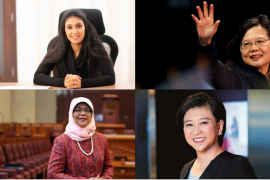By: Ruby Hamad
This week, Russia is on the verge of passing a bill that will decriminalise domestic violence except in cases of rape, and where it causes serious bodily harm. This seems a remarkable step backward in a country where 40 per cent of violent crime is already committed in family environments, and where more than 9000 women were killed in domestic violence incidents in 2013 alone.
Quite simply – because there is always a danger that zealous religious conservatives will be appeased by politicians that, driven by their own agendas, are willing to use the rights of women as a bargaining chip: something that can be negotiated, traded away, and betrayed.
The Russian bill has been spearheaded by ultra-conservative MP, Yelena Mizulina, demonstrating once again how patriarchy is all too often policed by women who bafflingly appear to view themselves as an exception to the gender stereotype they seek to impose on other women.
While it’s easy to assume that all these politicians explicitly hate women, the truth is perhaps even more frightening – they see women as expendable.
Although many of those Russian politicians may not personally hit their wives or even condone such behaviour – they just happen to be prepared to indulge those that do. Meanwhile, for the Yelena Mizulinas of the world, adherence to so-called “traditional family values” is a single-minded obsession, one on which they will not budge.
To put it another way: restricting women’s rights means more to Mizulina than protecting them does to the other predominantly male politicians in the parliament. This is the nature of political negotiations; each side knows they can’t get everything they want, so they have their non-negotiables and those they are willing to concede.
All too often, it is the rights of women that are conceded.
In one of his first acts as President, Donald Trump this week signed an executive order reinstating the gag rule prohibiting aid agencies that receive US funds from even discussing abortion with the women they support.
This is something women in Afghanistan are all too aware of. The fall of the Taliban shortly after the US invasion in 2001, was meant to herald a new era in women’s rights. Certainly, great inroads were made, such as a 25 per cent quota for women in parliament. However, within a few short years, President Hamid Kharzai proved himself willing to bargain away women’s lives and bodies to appease his own country’s conservatives. Among other concessions, Hamid introduced the Shia Personal Status Law, regulating the lives of the country’s Shia population and granting almost complete control of a woman’s life to her husband.
Do not think Australia is immune to this ambivalence politicians have for the rights of women. As recently as 2013, then-premier of Victoria Denis Napthine bowed to conservative Christian evangelical MP Geoff Shaw to allow a conscience vote on abortion reforms.
This followed previous attacks on reproductive rights from politicians such as Family First’s Steven Fielding and the Democratic Labor Party’s John Madigan.




